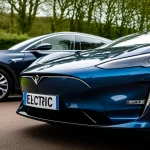Key obstacles UK automakers face in electric vehicle adoption
The transition to electric vehicles (EVs) presents significant challenges for UK automakers. One of the foremost barriers is limited access to battery raw materials and production capabilities. The UK lacks sufficient domestic supply chains for essential minerals like lithium and cobalt, critical for battery production. This reliance on external suppliers complicates efforts to scale EV manufacturing efficiently.
Another major issue lies in the disrupted automotive supply chains during the shift to electric platforms. Components tailored for internal combustion engines no longer match EV requirements, forcing manufacturers to overhaul procurement strategies and supplier relationships. This disruption introduces delays and escalates costs, which compound the overall difficulty of transitioning.
Additional reading : What Are the Environmental Impacts of Electric Vehicles in the UK Automotive Industry?
Additionally, the high research and development costs associated with new electric platforms weigh heavily on manufacturers. Developing state-of-the-art battery technology, software integration, and EV-specific components demands substantial investment. These upfront expenditures present financial risks, especially for smaller UK firms lacking vast capital reserves.
Collectively, these industry barriers form a complex environment in which UK automakers must innovate rapidly while managing supply constraints and escalating expenses. Successfully navigating these obstacles is critical for maintaining competitiveness in the evolving automotive market.
Also to see : How do UK car manufacturers ensure quality and safety standards?
Impact of charging infrastructure and regulatory landscape
The development of a robust EV charging infrastructure UK is crucial to accelerating the electric vehicle transition. However, the current insufficient nationwide EV charging network poses a significant bottleneck. Many areas, especially rural and suburban regions, lack convenient access to fast chargers, which deters potential EV purchasers concerned about range anxiety and charging convenience.
Government policy plays a central role in shaping the landscape. Frequent changes in regulations for electric vehicles and varying incentives introduce uncertainty, complicating long-term planning for automakers and consumers alike. For example, modifications to subsidies or grants can directly influence EV adoption rates, impacting manufacturer demand forecasts and investment decisions.
In addition, industry compliance with tightening emissions standards and mandatory electric vehicle targets places further pressure on UK automakers. Meeting these evolving regulatory requirements often demands costly upgrades to manufacturing processes and additional reporting obligations. This regulatory burden reinforces the broader industry barriers already present due to supply chain disruptions and R&D expenses.
Addressing the combined challenges of EV charging infrastructure UK and regulatory shifts requires coordinated efforts between government bodies, automakers, and infrastructure providers. Enhancing the charging network while providing clear, stable policies can help mitigate these key obstacles and support sustained growth in electric vehicle adoption.
Workforce transformation and skills gap
The shift to electric vehicles necessitates a profound workforce transformation within the UK automotive sector. One of the most pressing challenges for UK automakers is the need to retrain large segments of their workforce. Traditional skills centered on internal combustion engine assembly and maintenance become less relevant, while expertise in battery technology, electric powertrains, and software integration grows critical.
Automotive workforce reskilling involves extensive training programs focused on emerging EV technologies. This effort is essential to bridge the widening skills gap that threatens to slow the industry’s transition. Without timely and effective skills development, manufacturers face labor shortages in key areas such as battery production and electric system diagnostics.
Moreover, this transformation impacts industry employment patterns. While the decline in traditional manufacturing jobs is a concern, new roles are simultaneously emerging in EV design, software engineering, and advanced manufacturing processes. Successfully managing this transition means balancing job losses with creation, helping employees adapt through continuous learning and reskilling initiatives.
The capability to rapidly upskill workers directly affects the speed and quality of the electric vehicle transition. Automakers investing in comprehensive electric vehicle training programs position themselves to overcome labor constraints and maintain competitiveness. Conversely, insufficient workforce development can become an additional industry barrier that compounds existing challenges in supply chain and technology adoption.
Market competition and consumer challenges
The electric vehicle market competition in the UK is increasingly fierce, placing considerable pressure on UK automaker competitiveness. Established international EV brands with extensive resources and mature technology portfolios dominate much of the market. This dominance challenges UK automakers to innovate rapidly and differentiate their offerings to maintain relevance and market share.
Consumer behavior adds another layer of complexity to the electric vehicle transition. Despite growing interest, many potential buyers exhibit consumer hesitancy due to concerns over EV range, charging convenience, and upfront costs. These misconceptions about EV practicality can slow adoption rates, particularly among drivers accustomed to traditional petrol or diesel vehicles.
Addressing these challenges requires a two-pronged approach. First, UK automakers must invest in developing affordable, reliable EV models that appeal to diverse customer segments, strengthening their competitive position. Second, expanding public awareness through education campaigns about the benefits and practicalities of EV ownership can help reduce consumer doubts.
Strategically navigating the electric vehicle market competition while overcoming consumer adoption EVs barriers is crucial for UK manufacturers to thrive as the industry evolves. This balance will determine how successfully UK automakers capture growing demand and support the overall electric vehicle transition.
Case studies: Responses from major UK automotive manufacturers
In addressing the challenges for UK automakers during the electric vehicle transition, leading British car manufacturers have adopted distinct strategies to overcome pressing industry barriers. For example, Jaguar Land Rover has accelerated its shift toward electrification by committing substantial investment to expand its battery production capabilities and develop new electric models. This reflects a recognition that battery production capacity is essential to compete effectively amid supply chain constraints.
Nissan UK exemplifies proactive adaptation through partnerships and innovation. The company has focused on enhancing integration within the UK’s EV supply chain, ensuring more reliable access to components while optimizing production efficiency. Its strategy underscores the importance of resolving supply chain bottlenecks and minimizing disruption during the shift away from conventional platforms.
These UK automaker electric vehicle strategy examples highlight pragmatic approaches addressing three main pain points:
- Investing in in-house battery research and technology to reduce reliance on external suppliers.
- Collaborating with government and industry partners to improve the EV charging infrastructure UK.
- Prioritizing workforce transformation through targeted electric vehicle training programs.
By implementing comprehensive plans that tackle supply chain weaknesses, production challenges, and workforce needs, these manufacturers demonstrate how industry examples can guide others in navigating the complex demands of EV adoption. Their progress provides a roadmap for maintaining UK competitiveness while driving forward the broader electric vehicle industry.









